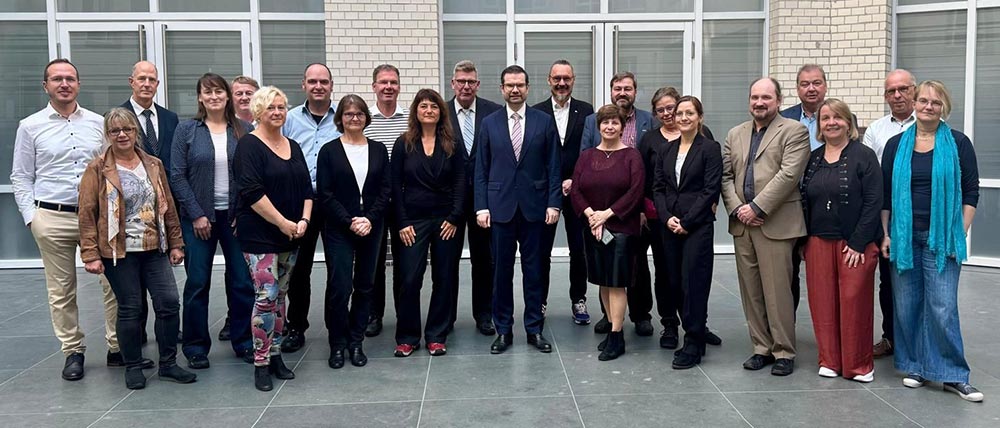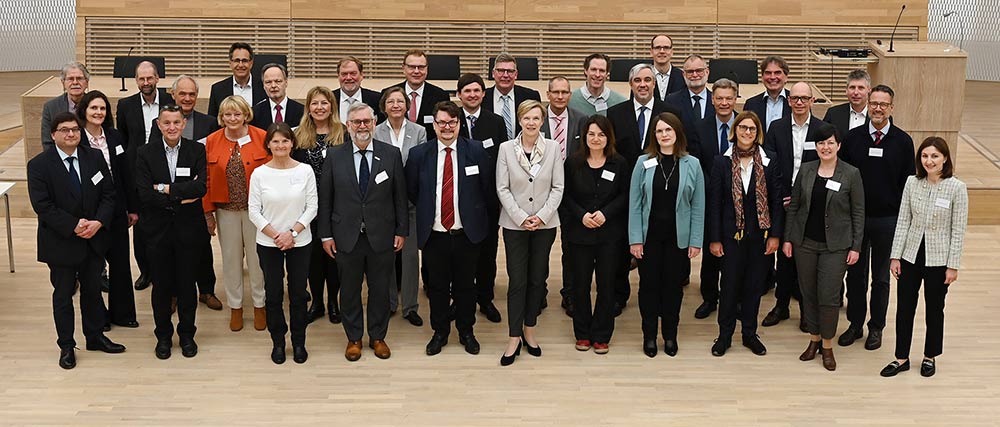
Overview National cooperation projects and User Advisory Council on Patents/Utility Models
Many different organisations, one common goal: the DPMA champions the establishment of a strong and experienced network for the protection of intellectual property. Our partners are important stakeholders in the field of IP rights, from chambers of industry and commerce to trade associations, universities promoting innovation and even customs. Together with the patent information centres, we offer professional services all over Germany, especially for SMEs.


Locations of the German Patent and Trade Mark Office
There is strength in numbers. At the DPMA, we know this — which is why we see ourselves as a central stakeholder in a Germany-wide network of partners for the protection of intellectual property. For many decades now, we have worked together with the patent information centres (PIZ), which complement our network consisting of chambers of industry and commerce, trade associations, universities promoting innovation and customs. The 16 PIZ can be found in almost every German Land and are an essential component of the German innovation landscape. As part of the European PATLIB network with more than 300 partners, they primarily act as regional and, above all, neutral points of contact for economy, science and individuals who are looking for advice and support regarding IP rights. Small and medium-sized enterprises (SMEs), new establishments and start-ups, but also technology transfer offices at universities and institutions of higher education value the comprehensive and individual services of the PIZ. These range from personal consultations to identifying suitable IP strategies as well as searching for patents, trade marks and designs in national and international databases. With their expertise, the PIZ make an essential contribution to overcoming supposed and actual obstacles to the protection of innovations and help their customers gain a clear competitive advantage. All this just affirms our intention to expand our collaboration in the coming years and to provide new impetus.
For many SMEs, the date is circled in red in their calendar: the nation-wide PIZnet awareness week, which took place in November 2024 for the eighth time, this time together with the “Global Entrepreneurship Week Germany”. The thematic connection is obvious: the awareness week primarily targets founding teams and start-ups that want to take advantage of the free, confidential and neutral PIZ consultations regarding the utilisation of IP and strategies for risk mitigation. They received an initial assessment of their companies’ individual IP situation and the economic opportunities and risks it presents, as well as an auditor’s report full of valuable tips for optimising their companies’ IP situation. The DPMA, which was involved in the development of the PIZnet awareness week, was very pleased with the positive response the event received!
The annual PIZ conference has become a regular element of the collaboration between the DPMA and the PIZ. The event is characterised by a familiar, open and relaxed atmosphere which facilitates the exchange about current topics, new developments in the IP landscape and joint projects for strengthening IP awareness. And of course, we also discussed ideas for the strategic long-term continuation and expansion of our own exclusive collaboration.
Speaking of strategy: Katja Behr, Head of the Department for Patent Law at the Federal Ministry of Justice, not only talked about the current development of new bills concerning IP rights but also provided detailed insights into the establishment of a national IP strategy. The latter is something that has not only been called for by the Federation of German Industries, but also by many other IP stakeholders that want to strengthen the appeal of Germany as a business location with a vibrant innovation landscape. With that in mind, the PIZ also discussed the growing importance of IP in education. To raise the public’s awareness for maintaining a strong innovation ecosystem, the topic of intellectual property should already be covered in an age-appropriate way at schools and universities; this is something everyone present agreed on and various strategies and solutions were discussed.
Just as in previous years, we enjoyed the exchange with the PIZ very much. These conferences strengthen our long-standing cooperation and offer a valuable platform to discuss trends, changes and strategies for the protection of IP, and they also give new impetus.


On the occasion of the publication of the annual report, we take a look back at the second term of the DPMAnutzerbeirat (DPMA User Advisory Council) for patent and utility models. A good time to take stock!
Whether patent quality, increasing the attractiveness of the examination procedure or raising awareness for IP rights: in its capacity as advisory body, the DPMAnutzerbeirat has made numerous suggestions and has proven itself to be a valuable source of new ideas. The topics that were cause for the most intense debates were the quality of our IP rights as well as the timeliness of search reports, communications and decisions. The use of AI for patent examinations, the DPMA’s new statutory information duty and the option to participate in hearings via video conferences were further focuses of the second term. The council provided many useful incentives, and we will also continue the exchange on the aforementioned topics in the next term — in the interest of all users.
Based on the evaluations that took place in the first quarter of 2024, we systematically investigated the DPMAnutzerbeirat’s framework and working method. The participants of the study included the members of the DPMAnutzerbeirat, colleagues from the various specialist departments and senior management. After analysing the evaluation results, we can confirm the DPMAnutzerbeirat‘s function as external advisory body. The overall response showed the high acceptance of the council and characterised it as an important feedback channel. Especially the direct and confidential exchange, the opportunity to switch perspectives and the DPMA’s open ear for the wishes and needs of the user groups were emphasised by the members of the DPMAnutzerbeirat. The evaluation results will also inform the preparations for the next term, for example when it comes to proposals for selective changes of represented user groups in the DPMAnutzerbeirat.
In its second term, the DPMAnutzerbeirat met for eight sessions. The next term of appointment will commence with the constituent meeting of the council in the first half of 2025 and last until 2029.
We want to thank all members for their great work in the DPMAnutzerbeirat and are looking forward to the next chapter!

Interview “The patent information centres should be part of a national IP strategy”
Arne Krüger, Head of the working group of German patent information centres (piznet e.V.), explains why the cooperation between the patent information centres within piznet offers SMEs additional value, how the patent information centres want to grow — and what he would like to see from the government.

Mr Krüger, the patent information centres are independent service providers and each has its own regional customers. What do they need piznet for?
piznet is a platform that supports the professional exchange and the networking between our 16 patent information centres (Patentinformationszentren, PIZ) on a national as well as a European level. In addition, we have national IP service providers as sustaining members that work very closely with us and develop services for our customers in cooperation with us. Together, we define shared quality standards for our IP searches and coordinate our training needs with each other and the DPMA. We support one another with marketing activities and trainings and organise free events, such as the joint awareness week with free consultations for companies, our annual conference or the “IP Enforcement Day”.
All these activities enable interested parties, customers and our partners to access an extensive network of experts — across regional and even national borders. This is because piznet is part of the PATLIB network, which connects more than 300 European patent information centres. The yearly PATLIB conferences give us the opportunity for international exchanges and allow us to present the latest developments or interesting topics on the European level — which also secures us the support of the European Patent Office.
How do you define the shared mission of the PIZ?
Our shared mission consists in providing high-quality, neutral information about IP rights in the German Länder and to facilitate the access to technical and scientific knowledge.
We are the first point of contact for customers who are considering protecting their intellectual property, and we offer a wide range of services: we regularly offer initial consultations for inventors with local patent attorneys as well as IP scans and consultations regarding funding opportunities. Our PIZ at universities are also involved in the patent management and technology transfer within start-ups and SMEs.
Since each PIZ specialises in a different topic, we can cultivate those synergies to cover a broad spectrum of tools and special subjects. If some customers’ questions cannot be answered satisfactorily by the local PIZ, they are forwarded within the network to the PIZ that has the most expertise in this field. This means our customers benefit from the entire German as well as European network, directly at the location closest to them.
Does the protection of intellectual property have the same importance everywhere? Or are there regional differences?
In general, the protection of IP is considered an essential factor for economic development everywhere. But there are still big regional differences, as the annual statistics by the DPMA show. There are particularities of the economic structures that lead to a different focus. The regions in Southern Germany with a lot of industry and a dense population have very high application numbers, but there is also a lot of inventive activity in the East and the North. A study by the German Institute for Economic Research (Deutsches Institut für Wirtschaftsforschung, DIW Berlin) from last summer showed that, based on the number of students, the Eastern universities file the most applications in Germany.
To help balance out the situation, it is our goal to have a strong presence in all regions of Germany. This way we can raise awareness for IP rights everywhere — at companies as well as in politics and the public administration.
If you were granted one wish for the PIZ, what would you ask for from the government?
My biggest wish would be for more focused innovation policies that actively recognise and support the value IP rights have for economy and society. Germany urgently needs a national IP strategy that not only manages the status quo but also incorporates a future-oriented approach. It should strengthen Germany’s technological sovereignty, promote digital processes and facilitate international collaborations. The new federal government should make the incorporation of the tasks, the role and the importance of a patent information centre in every Land a mandatory part of the national IP strategy. And I would like to see the funding of the patent information centres’ work regulated by law. At the moment, the budget caps at funding bodies lead to downsizing and therefore to limitations of the services provided to the public. The important work of raising awareness for IP rights cannot be done in a cost-effective way or as a purely private enterprise — for this purpose, we need political commitment as well as the insistence by the PIZ.
What role does the DPMA play in your work?
The DPMA is not only our most important partner, but also the central authority for the entire IP rights system in Germany. By providing clear provisions, technical and regulatory support and a stable framework, the DPMA secures the quality of all our IP rights. Together with the patent courts and the patent attorney bar it plays an essential part in the legal protection and strengthens the trust in the enforcement of IP rights, especially for medium enterprises.
In addition, the DPMA is a crucial multiplier for our services. A significant part of our external customers finds their way to us via the platforms and information provided by the DPMA. The DPMA also actively supports the development of the PIZ, e.g. by offering high-quality trainings, free workshops or sending expert speakers to our events. It has a leading role in the European patent landscape. Our close cooperation is a crucial factor in ensuring that we can always offer our customers the highest level of service and enables us to continuously work on improving the protection of intellectual property in Germany.
What will your work focus on in the near future?
The future of the PIZ will be shaped by two important developments: the advancement of digitisation and the strengthening of the European network. We strive to further digitise our services and to refine our information systems to keep up with the growing challenges of a data-driven economy. The use of AI plays an increasingly important part in this as well, e.g. in the patent search or the automated analysis of IP data.
At the same time, the close collaboration within Europe is crucial to make the protection of intellectual property even more effective at an international level. Strengthening the PATLIB network will be another key task to further improve the knowledge transfer between national and European IP institutions.
The patent information centres have been trusted partners for economy and science in Germany for a long time. I am looking forward to continue this journey together with the DPMA and our partners and to actively shape the future of the protection of industrial property.